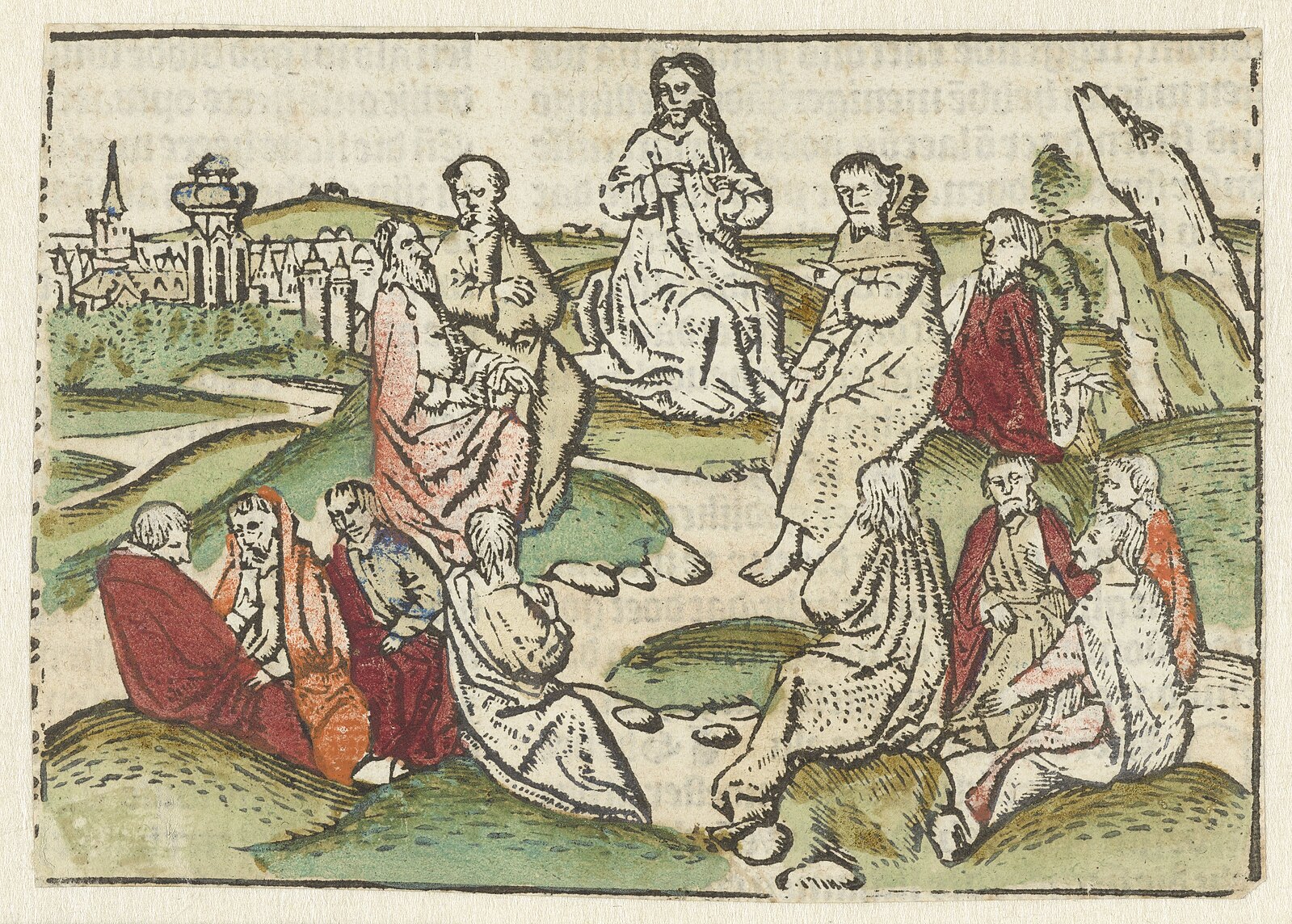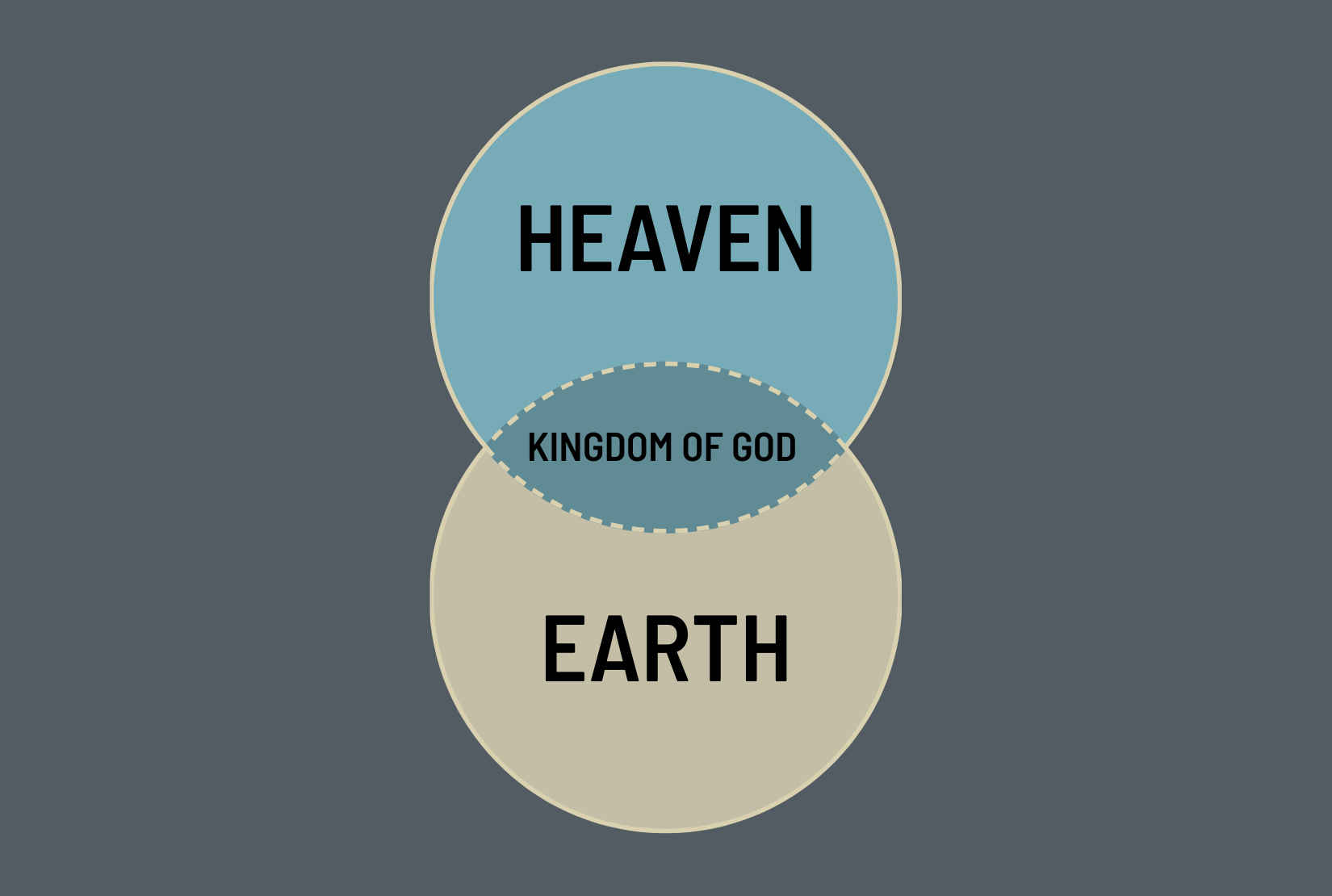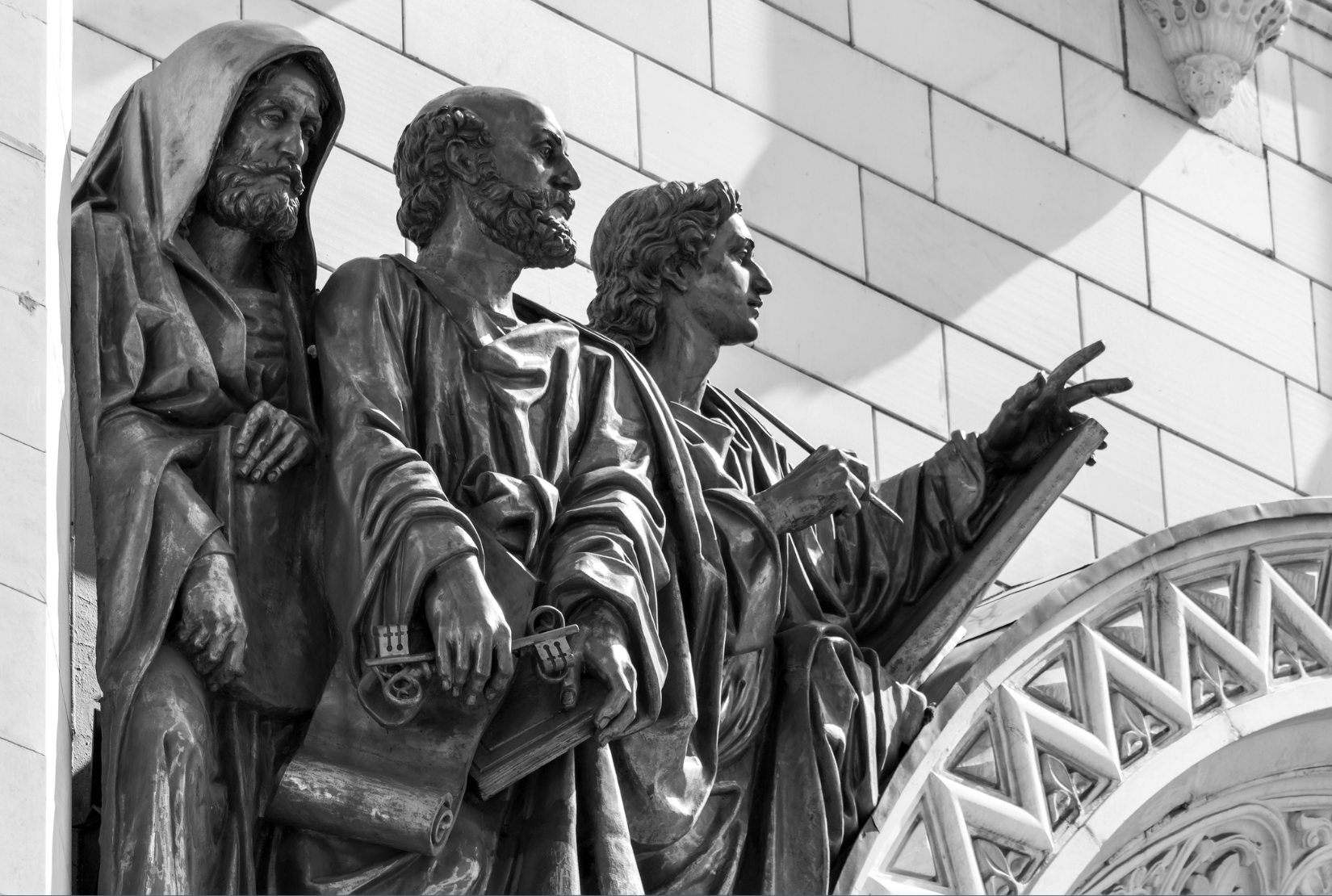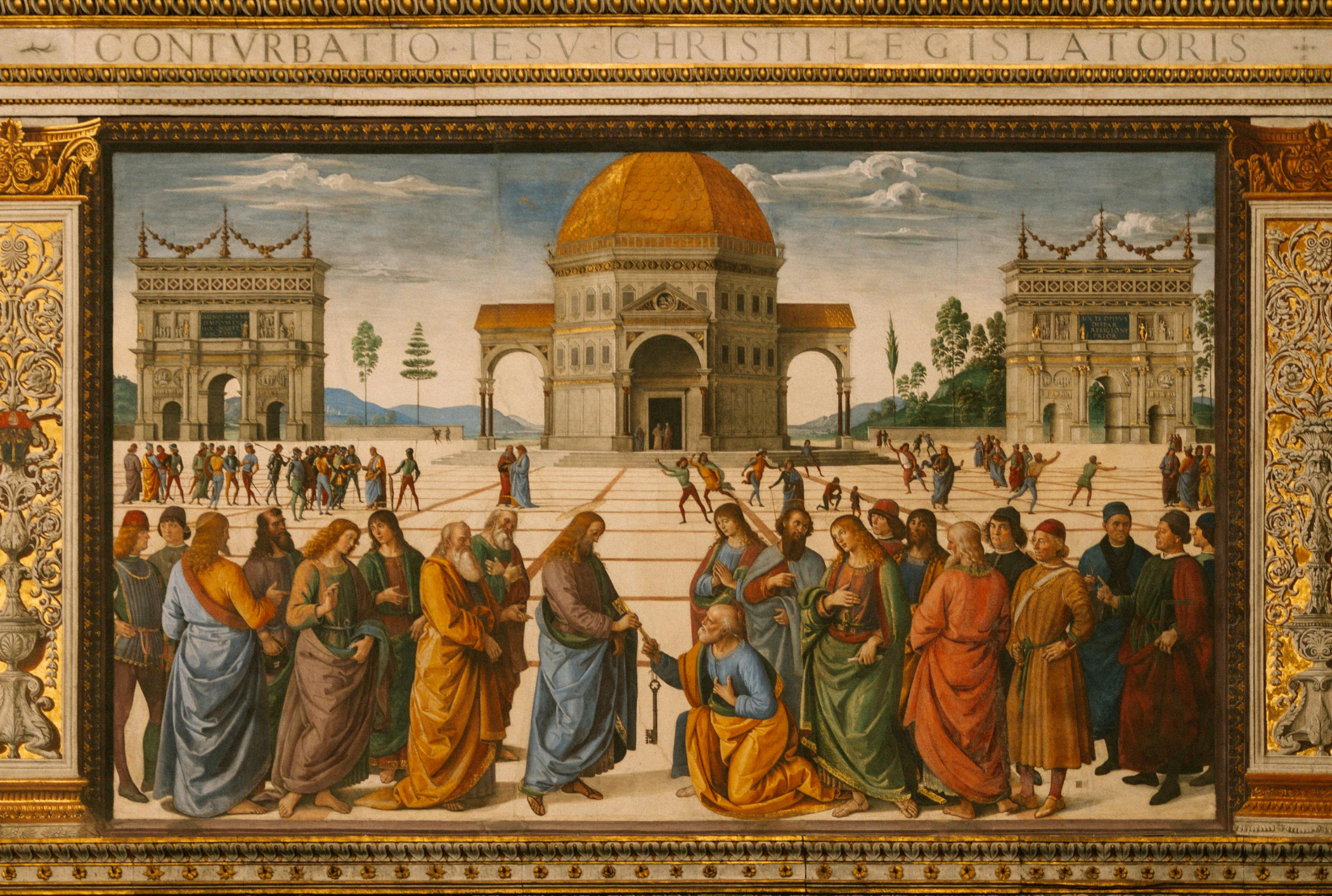Part 1: What is the Gospel of the Kingdom of God according to Jesus?
What is the gospel? This question has led to various interpretations over the centuries, emphasizing different aspects of faith, salvation, and the central message of Christianity. Often, we select a few verses and build a simplistic theology, rather than examining the deep theological themes that run throughout the narrative of Scripture. This selective approach can limit the scope of the gospel.1 In reality, the message of the Gospel of the Kingdom of God is much broader than many contemporary interpretations suggest. To truly understand what the gospel means, we must go back and examine how Jesus and the apostles spoke of it, grounding our understanding in His message of the arrival of the Kingdom and its transformative power.
As soon as Jesus returned from His 40 days of temptation in the desert, He began preaching a simple yet profound challenge: “Repent, for the kingdom of God has come near!” (Matthew 4:17). In saying this, Jesus was not offering a new way to enter heaven after death, but announcing that the government of heaven, the very life of heaven, was now intertwining with the earth in a new way.2[ii] He urged His listeners to repent (Greek: metanoia), to experience a deep transformation of mind, heart, and direction in life; and this not merely to improve morally, but in view of the radical new reality He called “the kingdom of God.” Jesus used the term “empire” (Greek: basileia) of God, the same word used to describe the Roman Empire, pointing to a countercultural and divine reign that contrasted with earthly powers. A basilea is not an abstract concept; it includes a people, a land, and a king or queen who governs.
Jesus proclaims that the Kingdom of God has come to challenge all false kingdoms, offering hope to those suffering under the brutality, coercion, and greed of human empires.
When Jesus declares that “the basileia of God is near,” He is announcing that the Kingdom of God has come to challenge all false kingdoms, offering hope to those suffering under the oppression and greed of human empires. By connecting the “gospel” or “good news” (Greek: euangelion) with “the kingdom of God,” He was deliberately invoking a term associated with the Roman Empire. In that context, the “good news” often referred to imperial proclamations, such as the birth of a new emperor or military victories. Therefore, when Jesus asks, “Do you believe the Gospel?” He is saying, “Do you believe the good news of this new kingdom breaking into the world?” This bold and subversive message presents the Kingdom of God as a radical alternative to the oppression, violence, and corruption of Rome and its local authorities. Jesus proclaims that the Kingdom of God has come to challenge all false kingdoms, offering hope to those suffering under the brutality, coercion, and greed of human empires. Ultimate authority does not rest in Caesar, but in the Creator, and God’s transformative reign is not limited to the spiritual; it will have profound implications for justice, healing, peace, and the renewal of all creation, establishing a way of life based on God’s justice, compassion, and Shalom.3

- The Kingdom of God was the theme of Christ’s first sermon: “After John was put in prison, Jesus went into Galilee, proclaiming the good news of God. ‘The time has come,’ he said. ‘The kingdom of God has come near. Repent and believe the good news!'” (Mark 1:14-15).
- It was the only message he called the Gospel: “Jesus went throughout Galilee, teaching in their synagogues, proclaiming the gospel of the kingdom, and healing every disease and sickness among the people” (Matthew 4:23).
- Jesus understood that his mission and the reason he was sent were to announce and embody the Kingdom of God: “I must proclaim the good news of the kingdom of God to the other towns also, because that is why I was sent” (Luke 4:43).
- It was the central theme of his teachings to the disciples during the last forty days on earth: “After his suffering, he presented himself to them and gave many convincing proofs that he was alive. He appeared to them over a period of forty days and spoke about the kingdom of God” (Acts 1:3).
- Jesus said that the Kingdom is the key to understanding his teaching: “He said, ‘The knowledge of the secrets of the kingdom of God has been given to you, but to others I speak in parables, so that, though seeing, they may not see; though hearing, they may not understand” (Luke 8:10).
- In the Sermon on the Mount, Jesus said the Kingdom of God should be our priority, and everything else would be added to it: “But seek first his kingdom and his righteousness, and all these things will be given to you as well” (Matthew 6:33).
- The coming of the Kingdom is the first request in the prayer Jesus taught us: “Your kingdom come, your will be done, on earth as it is in heaven” (Matthew 6:10), reinforcing the idea that the Kingdom of God is not only for the afterlife but for God’s will to be done on earth now.
- Jesus even said, “This gospel of the kingdom will be preached in the whole world as a testimony to all nations, and then the end will come” (Matthew 24:14), pointing to the universality of this message.
- Jesus taught about the Kingdom through parables. For example, “The kingdom of heaven is like a mustard seed, which a man took and planted in his field. Though it is the smallest of all seeds, yet when it grows, it is the largest of garden plants and becomes a tree, so that the birds come and perch in its branches.” He also compared it to yeast: “The kingdom of heaven is like yeast that a woman took and mixed into about sixty pounds of flour until it worked all through the dough” (Matthew 13:31-33). These parables illustrate the “already, but not yet” nature of the Kingdom, which has begun but still exists in a world where good and evil coexist. The image emphasizes the gradual but unstoppable growth of the Kingdom, starting small but expanding to transform individuals and all of creation.
The Kingdom was at the center of Jesus’ preaching, healing, and ministry.4 It is a theme that extends from Genesis 1 to the penultimate paragraph in Revelation 22. It is as if Jesus were saying: “You are so concerned with Caesar’s oppressive empire, the unstable kingdom of Israel, and your own success in this world, that you are overlooking what truly matters. The Kingdom of God is here, now, available to all! This is the greatest treasure. God’s rule is breaking into human life, transforming everything for those who embrace it and choose to live under its authority, impacting all dimensions of life: spiritual, social, and political. I am not asking you to wait for heaven; I am inviting you to live under the government of heaven here and now. Live as citizens of this Kingdom, embody its values, and work toward its full realization in the world. Believe in this good news and follow me, and I will teach you how to walk in this new way of life.”5
Consequently, the message of the gospel cannot be separated from the message of the Kingdom of God, as they are deeply intertwined in Jesus’ teachings and are fundamental to his proclamation. There is no gospel without the Kingdom, as the Kingdom is both the content of the gospel and the driving force behind God’s mission to redeem and restore all of creation. This theological perspective shifts the focus from a distant paradise to a present reality that transforms both individuals and societies. Jesus’ mission statement, as articulated in Luke 4:18-19, underscores this connection: “The Spirit of the Lord is on me, because he has anointed me to proclaim good news to the poor. He has sent me to proclaim freedom for the prisoners and recovery of sight for the blind, to set the oppressed free, to proclaim the year of the Lord’s favor.”

This passage is foundational, clearly defining who Jesus is and what his mission is. Many scholars agree that “the year of the Lord’s favor” refers to the Year of Jubilee, described in Leviticus (25:8-13), which involved the cancellation of debts, the liberation of slaves, the rest of the land, and the return of property to its original owners.6 This concept of Jubilee forms the basis of Jesus’ mission and is central to the Gospel of Luke, which focuses on the transformation of social, economic, and political structures, as well as the lives of marginalized people.7 Luke presents the Kingdom of God breaking into the present age through Jesus, with his mission to restore the Jubilee for Israel and beyond. Jesus’ declaration is not a private affirmation, but a public proclamation of liberation, meant to bring about widespread social change. As N.T. Wright argues, Jesus’ ministry must be understood in its historical context, where Israel’s messianic hopes converge with the prophetic expectation of God’s reign. The gospel, in essence, is the story of Jesus, the Messiah who fulfills Israel’s hopes, inaugurates the Kingdom of God, and invites everyone into this new reality: “The kingdom is not about a new religious experience, but about the real sovereignty of God returning, embodied in the public life of Jesus.”8
In summary, Jesus’ message about the Gospel of the Kingdom can be defined as follows: “A new day is dawning! God is establishing a new world, a new reality, a new Kingdom. In this Kingdom, the poor, the rejected, and the marginalized will be welcomed and valued, fully restored to the community. What will matter is not external appearances, but the true condition of the heart. All evil, in any of its forms, will be exposed, confronted, and eliminated. In its place, justice, integrity, mercy, and peace will prevail.” 9
The Gospel of the Kingdom of God in the Preaching of the Apostles in Acts
After the resurrection and ascension of Jesus, the apostles continued his mission by proclaiming the Gospel of the Kingdom, as we can see throughout the book of Acts. Far from presenting a different or disconnected message, the apostles made it clear that the arrival of the Kingdom of God, announced by Jesus, was central to their teaching and preaching. They emphasized not only individual salvation but also the transformation of entire communities and nations under God’s reign.

- One of the first and clearest examples of this is Peter’s sermon at Pentecost, recorded in Acts 2. After receiving the Holy Spirit, Peter stood before a diverse crowd of Jews gathered in Jerusalem and proclaimed the fulfillment of God’s promises through Jesus Christ: “Therefore, let all Israel be assured of this: God has made this Jesus, whom you crucified, both Lord and Messiah.” When the people heard this, they were cut to the heart and said to Peter and the other apostles, “Brothers, what shall we do?” Peter replied, “Repent and be baptized, every one of you, in the name of Jesus Christ for the forgiveness of your sins. And you will receive the gift of the Holy Spirit. The promise is for you and your children and for all who are far off—for all whom the Lord our God will call.” (Acts 2:36-39). Here, Peter calls for repentance, repeating the same message that Jesus preached: “Repent, for the kingdom of God is near.”He announces Jesus as Lord and Messiah, terms that identify him as the anointed King of the Kingdom of God. The emphasis is on recognizing God’s reign and submitting to Jesus as the mediator of this kingdom.
- In Acts 3, Peter again connects Jesus’ message with the Kingdom of God: “Repent, then, and turn to God, so that your sins may be wiped out, that times of refreshing may come from the Lord, and that he may send the Messiah, who has been appointed for you—even Jesus. He must remain in heaven until the time comes for God to restore everything, as he promised long ago through his holy prophets.” (Acts 3:19-21). Peter’s words link the gospel with God’s final plan of restoration: the restoration of creation, of Israel, and of all nations. He anticipates the full realization of the Kingdom, where God’s rule will be fully established on earth, restoring everything to its original state. This restoration is the core of the apostolic proclamation and resonates with Jesus’ teaching about a Kingdom that would begin humbly but would grow to transform the world.
- Acts 8 gives us another important example through Philip’s ministry: “But when they believed Philip as he proclaimed the good news of the kingdom of God and the name of Jesus Christ, they were baptized, both men and women.” (Acts 8:12). Philip’s preaching in Samaria underscores how the early apostles continued to place the Kingdom of God at the center of the gospel message. He did not simply offer salvation as a personal experience; he proclaimed the arrival of the Kingdom of God breaking into human history through the person of Jesus Christ. Those who were baptized not only showed personal conversion but also a deep reorientation of their lives under the Kingdom of God. This act symbolized their commitment to living the new reality of God’s reign on earth, a reality where healing, justice, and transformation were at the forefront. Baptism was not just an act of personal faith; it was a public declaration of loyalty to the values of the Kingdom and a tangible step toward living out the transformative power of God’s reign in both personal and communal life.
- In Acts 10, we find Peter’s sermon to the Gentiles in Cornelius’ house. Here, Peter summarizes Jesus’ ministry as the inauguration of the Kingdom of God: “You know the message God sent to the people of Israel, announcing the good news of peace through Jesus Christ, who is Lord of all. You know what has happened throughout the province of Judea, beginning in Galilee after the baptism that John preached—how God anointed Jesus of Nazareth with the Holy Spirit and power, and how he went around doing good and healing all who were under the power of the devil, because God was with him.” (Acts 10:36-38). Peter declares that Jesus, through his life, death, and resurrection, has brought the Kingdom of God’s peace and liberation, a reign that frees people from the dominion of evil. This echoes the language of the Kingdom of God found throughout Jesus’ ministry, reinforcing the idea that salvation involves God’s comprehensive rule over every aspect of life.
- Another passage that highlights the apostles’ preaching of the Kingdom of God is found in Acts 19, where Paul continues his ministry in Ephesus: “Paul entered the synagogue and spoke boldly there for three months, arguing persuasively about the kingdom of God.”(Acts 19:8). This passage provides another example of how the Kingdom of God remained central in the apostles’ preaching, involving both Jews and Gentiles in discussions about God’s government and its implications for their lives. Paul’s persistence in arguing about the Kingdom of God for three months underscores the importance of this message as the foundation of the apostolic mission. It was not a secondary topic but the framework through which the gospel was understood and shared, inviting his listeners to a new life under the sovereign reign of God.
- Another strong example of Paul preaching the Kingdom of God is found in Acts 20: “Now I know that none of you among whom I have gone about preaching the kingdom will ever see me again.” (Acts 20:25). Here, Paul addresses the elders of the church in Ephesus, reflecting on his ministry among them. He explicitly states that his preaching focused on the Kingdom of God, again emphasizing that this was the core of his message wherever he went. Paul’s farewell highlights the lasting importance of his proclamation of the Kingdom, making it clear that the apostles saw their mission as spreading the news of God’s reign and calling people to live under it.
- Finally, in Acts 28, Paul’s unwavering dedication to proclaiming the Kingdom of God continues until the end of the book. Despite being under house arrest in Rome, the center of imperial power, Paul remains steadfast in his mission: “For two whole years Paul stayed there in his own rented house and welcomed all who came to see him. He proclaimed the kingdom of God and taught about the Lord Jesus Christ with all boldness and without hindrance.” (Acts 28:30-31). Even in confinement, Paul boldly proclaimed the inseparable message of the Kingdom of God and the Lordship of Jesus Christ. His preaching highlighted the countercultural nature of the Kingdom: God’s reign surpasses all human authority, including that of Rome and any other earthly empire. For Paul, the gospel was not just about personal salvation but about Jesus as the true Lord, whose government transforms both individuals and the world. His message made it clear that the Kingdom of God had already begun, calling listeners to live in this new reality here and now.
In summary, the apostles’ preaching in Acts consistently focuses on the Kingdom of God. The Kingdom was not a secondary idea but the heart of their gospel proclamation. They understood that the Kingdom of God was a present reality breaking into the world and demanding a response. Their message called for repentance, transformation, and a reorientation of life under God’s government. This change was symbolized through baptism, a public act that signified a transfer of loyalty, a shift from the kingdom of darkness to the Kingdom of the Son of God. In their preaching, the Kingdom became the lens through which the gospel was understood, a gospel that promised not only personal salvation but also the redemption of all creation. In conclusion, the apostles continued the central message of Jesus’ ministry: the proclamation of the Kingdom of God. Whether in Samaria, Rome, or elsewhere, their preaching revealed that the Kingdom was not just a distant hope but the realization of God’s reign here and now. They called people to live under the heavenly government, to embody the values of justice, mercy, and peace, and to anticipate the full arrival of the Kingdom when God would make all things new.
We are ambassadors of the Kingdom, called to embody its character and mission in a world still in need of redemption.
The Gospel of the Kingdom of God in the Epistles and Revelation
Throughout the epistles and the book of Revelation, the Kingdom of God remains a fundamental reference, providing a framework through which the apostles and biblical authors understand the Christian life, the mission of the Church, and the final redemption of all creation. In these letters and visions, the Kingdom is described as a present reality that transforms the lives of believers and, in turn, progresses toward a future fulfillment in which God’s reign will encompass all creation. This focus on the Kingdom of God guides both the teaching and exhortation of the apostles, who call believers to live as citizens of an unshakable Kingdom, anticipating the final victory over sin and death.

The apostles not only preached the Gospel of the Kingdom verbally but also wrote about it extensively in their letters and epistles, reinforcing the centrality of the Kingdom of God as the heart of the gospel message. Paul, Peter, John, and the other writers of the New Testament consistently framed their teachings around the idea that believers are called to live under God’s reign, both in the present and in anticipation of its future fulfillment. Here are key passages from the epistles that further demonstrate how the apostles continued Jesus’ proclamation of the Kingdom of God:
In the epistles and Revelation, in addition to presenting the Kingdom of God as a present reality and a future hope, there is an emphasis on believers having an identity as ambassadors of the Kingdom, called to represent it and spread its values in a world that still needs redemption and transformation. This call to be ambassadors not only involves proclaiming the gospel message but also embodying the character and mission of the Kingdom in everyday life, showing the world what it means to live under God’s reign.
Citizenship in and Representation of the Kingdom
- The identity of believers as citizens of the Kingdom is a recurring theme in Paul’s writings. In Colossians 1:13-14, Paul explains that God “has rescued us from the dominion of darkness and brought us into the kingdom of the Son he loves, in whom we have redemption, the forgiveness of sins.” This image of a transfer from the kingdom of darkness to the light of the Kingdom of Christ reflects a shift in loyalty and identity.
- In Philippians 3:20, Paul writes: “But our citizenship is in heaven, and we eagerly await a Savior from there, the Lord Jesus Christ.” This statement reminds believers that their loyalty and hope are not found in earthly realities, but in the heavenly Kingdom. However, this does not imply, as some have interpreted, that we should disengage from this world. On the contrary, this citizenship calls believers to live in a manner worthy of Christ, reflecting on earth the values of justice and love that characterize the heavenly Kingdom. Thus, the prayer “your kingdom come, your will be done on earth as it is in heaven” invites us to embody and manifest the Kingdom of God in all aspects of our daily lives.
- Similarly, Peter reiterates this idea in 1 Peter 2:9, calling believers “a chosen people, a royal priesthood, a holy nation, God’s special possession.” This national and priestly identity highlights the mission of believers to live as ambassadors of the Kingdom, embodying the values of the Kingdom and challenging the norms and structures of the world that oppose God.
- James also alludes to the Kingdom when warning about how to treat the poor and oppressed. In James 2:5, he says, “Has not God chosen those who are poor in the eyes of the world to be rich in faith and to inherit the kingdom he promised those who love him?” This emphasis on the Kingdom underscores the justice and equity that God demands from his followers, calling them to treat others with love and live as heirs of a Kingdom where there is no favoritism or oppression.
- Finally, in 2 Corinthians 5:20, Paul states, “We are therefore Christ’s ambassadors, as though God were making his appeal through us. We implore you on Christ’s behalf: Be reconciled to God!” Here, Paul describes the mission of believers as ambassadors of Christ, bringing the message of reconciliation to all. This ambassador role involves representing the interests and values of the Kingdom of God in a broken world, seeking not only reconciliation between people and God, but also between one another. The peace and justice of the Kingdom should be reflected in the way believers live and act, promoting healthy relationships, forgiveness, and harmony.
The Kingdom as a Call to a Transformed Life

- The epistles emphasize that the Kingdom of God is not just a future hope but a present reality that should transform every aspect of believers’ lives. In Romans 14:17, Paul highlights that “the Kingdom of God is not a matter of eating and drinking, but of righteousness, peace, and joy in the Holy Spirit.” Life in the Kingdom involves more than performing external rituals or religious observances; it is about an inner transformation that produces righteousness, peace, and joy—virtues that should characterize the Christian community and challenge the world’s divisions and hostilities.
- Likewise, in 1 Corinthians 4:20, Paul emphasizes that “the Kingdom of God is not a matter of talk but of power.” This underscores that the Kingdom is a dynamic and transformative force capable of healing, liberating, and acting with mercy. This active power continues Jesus’ work through the ministry of the church and believers, demonstrating that the Kingdom brings real change to the world.
- Living in the Kingdom requires a lifestyle and ethics aligned with its values. In 1 Corinthians 6:9-10, Paul warns that “the unrighteous will not inherit the Kingdom of God,” emphasizing that those who persist in sinful practices are excluded from its inheritance. Similarly, in Ephesians 5:5, he stresses that “no immoral, impure, or greedy person… has any inheritance in the Kingdom of Christ and of God,” calling believers to reject sin and pursue holiness. This transformation involves living according to the values of the Kingdom and reflecting Christ’s character in every action and relationship.
- In Galatians 5:21, Paul warns that those who live according to the “works of the flesh” will not inherit the Kingdom of God. It is essential to note that the term “flesh” (Greek: sarx) here does not simply refer to “evil” desires or individual human weaknesses, as many interpret it, but to an identity based on self-sufficiency and selfishness, which leads to life patterns contrary to the values of God’s Kingdom. For Paul, living “according to the flesh” means responding to the pressures and values of the world—marked by ambition, consumerism, and excessive competition—often with a mindset of progressing at the expense of others. This way of life disconnects people from authentic communion with God and with one another. Therefore, Paul exhorts believers to abandon this “flesh” and to live according to the Spirit, which involves a process of transformation toward a way of life that reflects the values of God’s Kingdom: righteousness, peace, and love in daily life.
- Finally, in Philippians 2:15, Paul exhorts believers to be “blameless and pure, children of God without fault in a warped and crooked generation. Then you will shine among them like stars in the sky.” This transformed life is a testimony that reflects the holiness and righteousness of the Kingdom in a world marked by darkness and division. As lights in the darkness, believers are called to reflect the Kingdom, presenting an alternative of love and justice in contrast to the selfishness and corruption that dominate society.
Hope in the Full Realization of the Kingdom

- In 2 Timothy 4:1, Paul exhorts his disciple “in the presence of God and of Christ Jesus, who will judge the living and the dead, and in view of his appearing and his kingdom, I give you this charge…” anticipating Christ’s return to fully establish His reign over all creation. This vision of the Kingdom—present in today’s world yet awaiting its final fulfillment—reflects the “already, but not yet” tension found in Jesus’ and the apostles’ teachings. While the Kingdom began with the life and ministry of Christ, its full realization will only be seen at the Lord’s final return.
- In the letter to the Hebrews, the Kingdom of God is presented as an unshakable Kingdom that will be fully established at the end of time. In Hebrews 12:28, the author writes, “Therefore, since we are receiving a kingdom that cannot be shaken, let us be thankful, and so worship God acceptably with reverence and awe.” This statement reinforces the idea that the Kingdom is a secure and eternal reality that believers are already receiving, and this certainty should lead them to a life of worship and service to God.
- Revelation expands this vision of the future Kingdom by describing God’s ultimate triumph over the forces of evil and the establishment of His Kingdom over all creation. In Revelation 11:15, it is declared, “The kingdoms of the world have become the kingdom of our Lord and of His Christ, and He will reign forever and ever.” This statement points to the final fulfillment of the Kingdom, where all human power structures will submit to the Lordship of Christ. The Kingdom in Revelation is not only a hope but a certainty that will bring complete restoration to creation, eradicating sin, injustice, and death.
- The final vision in Revelation 21-22 describes the arrival of a new Jerusalem, where “God’s dwelling place is now among the people, and he will dwell with them” (Revelation 21:3). In this vision, the Kingdom of God is a place of peace, where every tear will be wiped away, and death will be no more. This culmination of the Kingdom reflects God’s redemptive purpose—not only to save individuals but to restore all of creation.
In summary, throughout the epistles and Revelation, the Kingdom of God is presented as the central framework guiding the life and mission of the church, a transformative reality in the present and a hope for future redemption. From Paul’s letters to the writings of Peter, James, and John, the apostles emphasize that the Kingdom is the core message of the gospel—not only as Jesus’ message but as the heart of the early church’s mission. The call to repentance, faith, and a life of holiness is an invitation to live under God’s reign here and now, in community and according to the values of justice, peace, and love that the Kingdom of God inspires. This vision of a present and future Kingdom gives meaning and direction to the Christian life, not limiting the gospel to individual salvation but inviting believers to actively participate in God’s mission to establish His Kingdom in the world, anticipating the day when “the kingdom of the world will become the kingdom of our Lord and of His Christ” (Revelation 11:15), when God’s reign will be fully realized throughout creation.
Part 2: The Need to Embrace a Broader Understanding of the Gospel

Considering Jesus’ and the apostles’ preaching about the gospel of the Kingdom of God, it is evident that many modern interpretations fall short. Within evangelical circles, the gospel is often reduced to a simplistic message: “Jesus died for you so that you can go to heaven after you die. Repent and accept Jesus as your personal Lord and Savior so that when you die, you will not be lost but have eternal life.” While this statement contains elements of truth, it does not encompass the full scope of the gospel proclaimed by Jesus and the apostles. Jesus is much more than a moral teacher who asks us to follow Him and live a righteous life to reach heaven after death. If this is our focus on the gospel, we have not truly understood His teachings on morality and love, for these only make sense if the Kingdom of God and His reign come to change the world.
The problem with this reductionist view is not just a theological error—it has practical consequences. It leads believers toward a privatized and transactional view of salvation, where “being saved” becomes synonymous with “believing the right things,” “avoiding certain sins,” and “regularly attending church to secure a place in heaven.” This limited vision strips the gospel of its transformative power, reducing it to a message focused solely on individual sin and personal salvation for the afterlife, while overlooking the profound impact of Jesus’ life, death, and resurrection on all aspects of life.
Dallas Willard, in The Divine Conspiracy, calls this reduction the “gospel of sin management.” He explains: “We have reduced the Christian faith to simply ‘removing sin,’ leaving people practically unchanged except that their ‘guilt’ has been removed. The message is often presented primarily as how to avoid sin and how to get to the kingdom of heaven after dying. In fact, many modern versions of the gospel treat Jesus only as a sacrificial lamb, with little to do with how we live day to day in the kingdom of heaven before we die, especially in the social, political, and cultural aspects of life. This has resulted in what some might call ‘vampire Christians’—those who want just enough of Jesus’ blood for the forgiveness of their sins but avoid a deeper, transformative commitment to Him until they reach heaven.”10 This limited view ignores the transformative power of the Kingdom of God in the present. It minimizes the richness of discipleship and does not invite believers to experience the reality of living under God’s rule in their daily lives.
“The gospel of the kingdom is not just the forgiveness of sins and a ticket to heaven; it is about living in the kingdom now, as apprentices of Jesus in the daily course of our lives.”
Dallas Willard
In contrast, the gospel of the Kingdom is much broader. As Willard emphasizes: “The gospel of the kingdom is not just the forgiveness of sins and a ticket to heaven; it is about living in the kingdom now, as apprentices of Jesus in the daily course of our lives.”11 It touches not only individual hearts but also entire communities and systems, inviting everyone to participate in God’s ongoing work of restoration and renewal. It calls for a radical transformation of all relationships—spiritual, social, political, and even ecological—reflecting God’s dominion over all creation. This broader vision invites believers to take part in the redemptive work of restoring and renewing the world. This requires discipleship and a shift in priorities, character, and mindset so that we may live lives characterized by justice, peace, humility, and love. In short, when the gospel is reduced to individual salvation, it creates a narrow and weakened mission. But a holistic understanding of the gospel of the Kingdom leads to a much broader mission that transforms all aspects of life. This more comprehensive vision invites Christians to be part of a story that is both personal and communal, touching social, political, and cosmic dimensions. The following sections will explore these dimensions of the gospel of the Kingdom, revealing the depth and breadth of the good news that Jesus proclaimed.
- Personal Transformation: A crucial dimension of the gospel of the Kingdom is personal transformation. Without genuine inner change, broader change is unsustainable. That is why Jesus begins His ministry with a call to repentance, inviting people to change their way of thinking and living. While the gospel certainly begins with the spiritual renewal of the individual, the transformation Jesus calls for goes far beyond moral improvement or securing eternal life. The Kingdom demands a complete renewal of the whole person—heart, mind, body, and spirit—aligning every part of life with God’s will. In the Sermon on the Mount, Jesus makes this clear when He says, “Seek first His kingdom and His righteousness, and all these things will be given to you as well” (Matthew 6:33). This is not just a command to prioritize spiritual matters; it is an invitation to reorient one’s entire life around the worldview, values, and reality of the Kingdom of God. The righteousness Jesus mentions is not limited to personal piety but extends to living in right relationship with God, neighbor, and creation. As Micah 6:8 states: “He has shown you, O mortal, what is good. And what does the Lord require of you? To act justly and to love mercy and to walk humbly with your God.” This righteousness includes mercy and humility, calling individuals to embody these Kingdom values in every area of life—whether in relationships, work, or community. True transformation in the Kingdom is holistic, touching every facet of life and reflecting God’s vision for human flourishing.
- Relational and Community Transformation: An essential dimension of the gospel of the Kingdom is relational and community transformation, centered on reconciliation. The Kingdom does not merely aim to change individuals or systems—it forms a new community, a people reconciled to God and to one another. The gospel creates a koinonia, a fellowship of believers who, through Christ, are called to embody God’s peace, forgiveness, and love. As the apostle Paul writes in 2 Corinthians 5:18-19: “All this is from God, who reconciled us to Himself through Christ and gave us the ministry of reconciliation: that God was reconciling the world to Himself in Christ, not counting people’s sins against them.” This ministry of reconciliation is the heartbeat of the Kingdom community, breaking down barriers that divide people—whether ethnic, social, or economic—and uniting them under the lordship of Christ (Ephesians 2:14-16). In the Kingdom, we are called to live in relationships marked by humility, mercy, and justice, reflecting the relational nature of our triune God. This means seeking forgiveness, rejecting hostility, and promoting peace in our relationships, modeling a radical and countercultural community. The ekklesia, as the earthly community of the Kingdom, demonstrates reconciled relationships—caring for one another’s needs, bearing one another’s burdens, and living in love and mutual submission. This relational transformation extends beyond the church, as believers are called to be peacemakers in the world. Thus, the gospel is not just a message of salvation; it becomes a lived reality of reconciliation, showing the world that the Kingdom of God truly restores all things, beginning with the healing of human relationships.
- Social Transformation: The gospel of the Kingdom not only calls for personal and relational transformation but also for profound social and political change that confronts systemic sin, oppressive powers, and structures opposed to God’s justice, mercy, and peace.12 This political dimension of Jesus’ message is often overlooked in modern interpretations that reduce the gospel to a private and individual matter. However, in Jesus’ proclamation, the Kingdom of God directly contradicted the oppressive structures of Rome and the religious elite of His time. By proclaiming the “good news of the Kingdom of God,” Jesus directly challenged the imperial power of Caesar, declaring that ultimate authority over the world did not reside in Rome or the Sanhedrin but in God. Through His teachings and actions, Jesus demonstrated that the Kingdom of God is rooted in the biblical concept of justice (mishpat), intended to restore right relationships among people, communities, and creation. The gospel of the Kingdom is therefore deeply connected to public life, economics, politics, ecology, and social justice. Indeed, Jesus’ followers are invited to participate in God’s mission to restore and redeem the world, becoming part of a new social order—the ekklesia—that reflects God’s reign, where salvation is holistic, bringing healing not only to individuals but also to broken systems and structures.
- Cosmic Transformation: The Kingdom of God encompasses not only human society but all of creation. Jesus’ miracles—healing the sick, raising the dead, calming storms—were signs of this cosmic renewal, demonstrating the Kingdom’s power over disease, death, and chaos. Throughout the biblical narrative, God is shown resisting everything that corrupts and distorts His creation. Through the life, death, and resurrection of Christ, these oppressive forces have been defeated, affirming that the Creator says “yes” to His world and “no” to everything that seeks to destroy it. This means that the Kingdom brings healing not only to individuals but also to communities, ecosystems, and all of creation, revealing God’s commitment to restoring and renewing the world He made. The apostle Paul emphasizes this cosmic scope in Romans 8:19-21, where he writes, “The creation waits in eager expectation… in hope that it will be liberated from its bondage to decay and brought into the freedom and glory of the children of God.” This shows that the redemptive reach of the Kingdom includes all of creation, freeing it from the power of sin and death to restore it to the state God originally intended. Colossians 1:20 reiterates this cosmic reconciliation, stating that “through [Christ], God reconciled all things to Himself… making peace through His blood shed on the cross.” This underscores that the Kingdom involves not only human salvation but also the restoration of all creation. Cosmic renewal is therefore central to understanding the full scope of God’s redemptive work. The resurrection of Jesus is the first sign of this new creation, showing that the Kingdom is not about escaping the world but renewing it. This cosmic vision challenges the church to go beyond evangelism, soul-saving, and traditional church planting to include environmental stewardship, justice, and active participation in God’s plan to renew all things. In this sense, the gospel of the Kingdom is good news not only for humanity but for the entire cosmos, calling believers to live as agents of God’s redemptive mission.
The ultimate vision of the Kingdom is revealed in Revelation 21-22, where John sees a new heaven and a new earth, with the New Jerusalem descending to earth. In this renewed creation, “God’s dwelling place is now among the people, and He will live with them” (Revelation 21:3). The final fulfillment of the Kingdom is God’s reign fully established over all creation, where every tear is wiped away, and death and suffering exist no more.
Part 3: What Was Jesus’ Plan to Advance the Kingdom of God?

To advance the Kingdom of God, Jesus employed a deeply intentional and relational approach, focusing on disciple-making rather than seeking mass movements or public approval. His strategy was to equip a small group of followers to embody and carry forward the message of the Kingdom. Rather than relying on grand displays of power, Jesus trained His disciples to live under God’s rule in tangible ways. His plan involved establishing ekklesias—missional communities—that would reflect God’s reign and serve as concrete signs of the Kingdom on earth.
At the heart of this mission was sacrificial love. Jesus believed that the Kingdom of God would come not through violence or domination but through love for enemies and sacrificial service. The Gospels present Jesus’ crucifixion as the moment of His enthronement, depicting Him as a King who conquers through selfless love rather than force. Through His death and resurrection, Jesus overcame sin and death, embodying the radically “upside-down” values of the Kingdom.
After His resurrection, Jesus sent His disciples to proclaim the good news of this Kingdom to the world, inviting people to pledge their allegiance to Him, the King who defeated death with love. These communities of followers were to embody the Kingdom through their lives, making the gospel not just a belief but a way of living. The following sections explore how disciple-making and the creation of these Kingdom communities became the foundation for advancing the gospel and transforming lives.
Strategy #1: Building a Disciple-Making Movement
Disciple-making was Jesus’ core strategy for advancing the Kingdom of God. Instead of prioritizing crowds or seeking public recognition, Jesus deeply invested in a small, committed group—building trust and friendship with His closest three, training and equipping the twelve disciples, and sending out the seventy to proclaim His Kingdom. He spent significant time with them, modeling Kingdom values and equipping them to embody and spread His message, live under God’s reign, and actively engage in His mission. As Robert Coleman highlights in The Master Plan of Evangelism, Jesus’ focus on a few faithful disciples unleashed a global movement, demonstrating that committed and deep disciple-making has the power to transform the world.
Unfortunately, much of modern Christianity has drifted from this model, often prioritizing numerical growth, influence, and programs over transformative disciple-making. Dallas Willard rightly critiques this trend, stating: “We have failed to be and make disciples of Jesus.” 13 The result is often a shallow form of Christianity that lacks the power to bring real change. The absence of deep formation leads the church to become irrelevant and disconnected from its mission, losing sight of the full vision of life in the Kingdom here and now. The Kingdom invites believers to align every aspect of their lives with its values—justice, mercy, peace, and love. Jesus’ Sermon on the Mount (Matthew 5-7) provides a model for this kind of life, calling His followers to be peacemakers, to hunger and thirst for righteousness, and to live with radical generosity and love.14 This Kingdom vision demands more than mere doctrinal assent or religious duty—it calls for active participation in God’s mission to restore the world. However, lasting change happens in community. That is why the gospel forms a new and alternative community—the ekklesia—dedicated to living under Jesus’ reign and embodying God’s justice, peace, and love for all to see.15 Disciple-making is not merely a private or spiritual matter but a transformative commitment to God’s mission, equipping believers to be Kingdom agents in every area of life. By cultivating a disciple-making movement, the ekklesia thus advances the gospel of the Kingdom. But how exactly?
Strategy #2: Establishing the Ekklesia as the Foretaste, Sign, and Instrument of the Kingdom
In Ephesians 1:10, Paul reveals the ultimate purpose of God’s Kingdom: to unify all things under Christ, demonstrating His grand vision of reconciliation and restoration for all creation. In this present era—between the inauguration of the Kingdom through Jesus and its final fulfillment at His return—the ekklesia is called to be the foretaste, sign, and instrument of this Kingdom and its restoration project. As ambassadors of the Kingdom, the church is tasked with representing God’s reign on earth, calling people to reconciliation with God and one another (2 Corinthians 5:20). As a foretaste, the ekklesia offers the world a glimpse of life under God’s reign—a life marked by love, forgiveness, justice, and peace. As a sign, the ekklesia points beyond itself to the future reality of God’s Kingdom, demonstrating through its communal life that a new way of living is not only possible but is already breaking in. As an instrument, the ekklesia actively participates in God’s mission to bring the Kingdom, working for justice, reconciliation, and renewal.
To fulfill this calling, the ekklesia must embrace the full gospel of the Kingdom, moving beyond a narrow focus on individual salvation. While personal salvation is vital, the mission of the ekklesia is far greater: it is called to embody the Kingdom on earth by transforming society, healing divisions, and restoring justice. Paul writes in Ephesians 1:22-23 that God has placed “all things under [Christ’s] feet and appointed Him as head over everything for the church, which is His body, the fullness of Him who fills everything in every way.” As the body of Christ, the ekklesia is the means through which His reign extends, encompassing spiritual, social, economic, and environmental renewal. The ekklesia must oppose oppression, racism, and exploitation, working for the liberation of the marginalized and the healing of divisions. In Ephesians 2:14-16, Paul speaks of Christ tearing down dividing walls to create “one new humanity” in Him, modeling the Kingdom’s unity and peace and providing a foretaste of God’s restorative work. Ephesians 2:10 highlights that we are created in Christ for good works, indicating the ekklesia’s active role in this renewal. Ephesians 3:10 further reveals the ekklesia’s role in displaying God’s manifold wisdom to spiritual authorities, making it a living demonstration of His Kingdom purposes. As this reconciled community, the ekklesia is called to embody the values of the Kingdom—justice, mercy, love, and peace—offering a tangible expression of God’s reign. Its mission includes:
- Proclaiming the Good News of the Kingdom of God.
- Teaching, baptizing, and discipling new believers.
- Responding to human needs through loving service.
- Raising a prophetic voice, transforming unjust social structures, challenging violence of any kind, and promoting peace and reconciliation.
- Striving to protect the integrity of creation, sustaining, and renewing the life of the earth.
The gospel ultimately calls individuals to a new way of life within the Kingdom, forming a community that embodies the Kingdom’s values. Shaped by the life, death, and resurrection of Jesus, this community is commissioned to be an agent of healing and reconciliation, uniting people into a new humanity—Jews and Gentiles, rich and poor, men and women—all united in Christ. The ekklesia is tasked with embodying the Kingdom through acts of love, justice, and hospitality, demonstrating that the gospel is a story that forms community. This is the beautiful mission of the ekklesia: to bring life into a world so often marked by decay.
Conclusion: How Successful Were Jesus and the Apostles in Advancing This Vision?

At the end of His life, Jesus showed few visible signs of success, and the fruit of His ministry may seem unimpressive to us. After three and a half years of ministry, the crowds that once wanted to crown Him as king were now crying out for His crucifixion. Judas betrayed Him, Peter denied Him, and the rest of the disciples abandoned Him. One might imagine Jesus saying, “My close group has deserted me, the crowds want me dead, but I believe my mother still believes in me.” In today’s world, Jesus might be considered a failure, unable to achieve the visible and numerical growth that many modern leaders value.
Something similar could be said of Paul. Although he is credited with founding or significantly influencing seven or eight churches in cities like Iconium, Lystra, Derbe, Philippi, Ephesus, the bustling city of Corinth, the intellectual center of Athens, and even the capital of Rome16, his mission might seem incomplete or even unsuccessful at the time of his death. When he was martyred in Rome, likely under Emperor Nero between A.D. 64 and 67, the Christian movement to which he had dedicated his life was still small and fragile. Paul died leaving behind a handful of house churches scattered throughout the empire, whose members faced persecution and hardships, while some of his communities struggled with internal conflicts, false teachings, and divisions, as was the case in Corinth.
However, assessing the success of Jesus and His apostles requires looking beyond conventional success metrics. Their apparent failure by modern standards was part of a broader divine plan. It is true that the nature of His Kingdom—”already present, yet not fully here”—has been a source of confusion and frustration, even for figures like John the Baptist, who, perplexed by the unexpected form of the Kingdom, asked, “Are you the Messiah who is to come, or should we expect someone else?” (Matthew 11:3). In His response, Jesus affirmed that the Kingdom was indeed unfolding in His ministry, though not as expected. First-century Jews anticipated a Messiah who would bring immediate relief from Roman oppression and total peace and prosperity. Instead, Jesus proclaimed a Kingdom that would begin with His presence and actions, empowering and equipping others to follow Him and emulate Him. From there, it would grow quietly yet powerfully, reaching every corner of the earth.
The Kingdom ignites a hope that transcends conventional expectations and brings healing and restoration to individuals and societies alike.
In Christ and Time, French theologian Oscar Cullmann uses an analogy from World War II to illustrate how Christ’s victory over spiritual forces is both present and awaiting complete fulfillment. Just as the outcome of World War II was effectively decided on D-Day, June 6, 1944, when Allied forces secured a foothold in Normandy, Christ’s definitive victory was won through His death and resurrection. However, just as the final victory in Europe (Victory Day) did not come until nearly a year later, on May 8, 1945, we still experience struggles, suffering, and death between Christ’s resurrection and the ultimate fulfillment of His Kingdom. Living between Christ’s resurrection and the vision of Revelation is like living between D-Day and Victory Day. Although victory is assured, conflict and hardship persist as we await the full realization of the Kingdom. In this phase of “already, but not yet,” forces of wholeness and loss, healing and suffering, justice and injustice, life and death coexist in dynamic tension. Jesus has initiated a decisive victory, and while the Kingdom continues to break into this world, this tension will persist until its final fulfillment at His second coming. Nevertheless, His victory over death and the promise of cosmic restoration offers believers an anchor of hope, especially in times of despair.
In summary, Jesus’ vision of the Kingdom began as a small, unassuming mustard seed, destined to grow into something transformative and unstoppable. Jesus taught that the Kingdom would not advance through political, economic, or military power but through the faithful presence of disciples embodying Kingdom values. The churches that Paul and some of the other apostles founded became the backbone of what would later become a movement capable of transforming the Roman Empire and carrying Jesus’ message to the farthest corners of the earth. Their teachings helped define Christianity’s identity as a faith not confined by ethnicity or geography but open to all who believed in Jesus Christ—His way, His truth, and His life. Their mission was not successful because of the number of churches established or the size of their followers, but because of their faithfulness to the calling God had entrusted to them. Today, this presence is expressed through ekklesias—communities that act as ambassadors of God’s reign in their places, demonstrating love, peace, and justice, and inviting others into a life of transformation (2 Corinthians 5:20). When these communities thrive and live according to their God-given purpose, they spread Jesus’ teachings and bring life, healing, and hope not only to individuals but to entire communities and even creation itself.
Despite many challenges and failures within the church, the influence of the Kingdom persists and is present worldwide, often silently and in unexpected places. This persistence is because the Kingdom of God is much greater than the institutional church, reaching every area of human existence and creation. Jesus’ success is evident in the lives and communities transformed by the values of the Kingdom, in the expansion of His teachings across diverse cultures, in the followers who join His mission and embody His vision, and in the miraculous renewal observed in places marked by brokenness, despair, and isolation. All of these represent glimpses of a world restored and reconciled to God, demonstrating that the Kingdom ignites a hope that transcends conventional expectations and brings healing and restoration to individuals and societies alike, pointing toward the day when the full reality of God’s Kingdom will be revealed, and His will be fully accomplished on earth as it is in heaven. This is why it is truly good news—the good news of the Kingdom!
APPENDICES
Appendix #1: A Brief Definition of the Kingdom of God

Based on the previous descriptions, we see that the gospel of the Kingdom of God, as presented in Scripture, is a profoundly complex reality. Far from being limited to a future hope, a specific location, or confined to the institutional church, the Kingdom is dynamic and all-encompassing, touching every aspect of life where Christ’s lordship is acknowledged and His will pursued. The following points offer a clear and concise definition of the scope, nature, and transformative impact of the Kingdom.
- Location of the Kingdom:
The Kingdom is any place or sphere—whether in heaven, on earth, in the church, a small group, a community, a family, a business, an organization, or personal life—where Christ reigns and governs. It is a realm where His authority, justice, and Shalom are active and present.
- The Heart of the Biblical Gospel:
Understanding the Kingdom is essential to grasping the central message of the Bible. Jesus’ teachings and actions focused on the Kingdom, which He saw as the master plan, the unifying purpose, and the ultimate will of God that brings redemption, coherence, and hope to the world.
- Presence and Expression on Earth:
The Kingdom is present on earth wherever God’s will is done. Although not visible like an earthly kingdom, its reality is made visible through the lives of its citizens, who, by trusting and obeying their King, demonstrate His love and compassion for others and for all creation.
- Divine Governance and Justice:
The Kingdom of God does not refer to a specific place, but to God’s rule and sovereignty breaking into the world through the work of Jesus. It is not a distant hope nor limited to the afterlife, but the beginning of God’s reign in the present, renewing and restoring all of creation. This governance is evidenced in the love of its citizens: love for God, for others, and for the world, marked by a commitment to justice, advocacy for the vulnerable, and care for the spiritual, physical, and social needs of people.
- The “Already” and “Not Yet” Tension:
The Kingdom of God is a reality with both present and future dimensions. Jesus inaugurated the Kingdom, but its fullness is still to come. This “already and not yet” tension reflects the nature of the gospel: while the Kingdom began with the life, death, and resurrection of Christ, it will reach its complete fulfillment in the future, with the ultimate renewal of all things (Revelation 21:5).
- Good News of Peace and Restoration:
The Kingdom is here—and with it, God’s rule, the reign of peace, the power to heal, transform, and rebuild what has been destroyed. This is the message of the gospel of the Kingdom: the announcement of God’s Shalom—that His justice, peace, healing, and righteousness are powerfully breaking into a broken and unjust world and transforming it from the inside out.
Appendix #2: What It Means to Seek First the Kingdom of God

In Matthew 6:33, Jesus urges His followers to “seek first the Kingdom of God and His righteousness, and all these things will be added to you.” This statement is not merely a call to moral living; it is a radical invitation to reorient our priorities. By telling them to seek the Kingdom “first,” Jesus redirects them from a life centered on self-sufficiency, wealth, or power, and points them toward a life of trust in God’s provision and commitment to His purposes.
- The Meaning of Seeking the Kingdom. To grasp the depth of Matthew 6:33, it is helpful to consider what “Kingdom” meant in Jesus’ time. For first-century Jews, a kingdom was a real and tangible society with a king, citizens, laws, and a distinctive way of life. Jesus presents the Kingdom of God as a divine reality breaking into our world, with God as the sovereign King and His teachings as the guiding law. This Kingdom challenges the values of earthly kingdoms, where power, wealth, and personal security often dominate. In contrast, in God’s Kingdom, love, generosity, and justice reign supreme.
- The Kingdom Versus Earthly Security. Earlier in Matthew 6, Jesus contrasts two ways of living: one rooted in anxious self-protection and another based on faith in God’s care. In a world marked by scarcity, violence, and injustice, our instinct is to focus on securing our own needs and those of our loved ones. But Jesus warns against making material concerns our top priority, noting that such anxiety can draw us away from living as citizens of God’s Kingdom. When He says, “all these things will be added to you,” He is not promising immediate provision of food, shelter, or safety, but offering a long-term vision of life under God’s reign—one that will ultimately restore creation to a state of peace and abundance. Jesus Himself lived in faith in this promise, despite experiencing poverty, betrayal, and suffering.
- Living as Citizens of the Kingdom. The call to “seek first the Kingdom” is an invitation to live today as though God’s Kingdom were already fully present, even though in many ways it is still a “now but not yet” reality. Jesus modeled this way of life by resisting violence, avoiding self-centered survival strategies, and fully trusting in God’s care. For Jesus’ followers, seeking the Kingdom means choosing love over survival instinct, generosity over self-reliance, and forgiveness over revenge. The early Christian community described in Acts 2 offers a compelling example of Kingdom-centered living. They supported each other, shared resources, and lived generously—even in the face of a hostile world. In embodying the Kingdom of God, they experienced freedom from the anxieties and pressures of a self-centered life.
- The Kingdom as Hope and Promise. Seeking the Kingdom of God is also an act of hope. Jesus’ teaching invites us to trust that one day God’s Kingdom will be fully realized—a world where love, peace, and justice completely prevail. Until then, we live in the tension of a world where danger, need, and suffering persist, yet we are called to respond as though God’s future Kingdom is already here. Jesus shows us that Kingdom life is not only for a future paradise; it is a way of living that begins now, transforming both individual hearts and entire communities. To “seek first the Kingdom” means to choose a lifestyle aligned with God’s ultimate purpose for creation, anticipating the day when His Kingdom will be revealed in full—bringing peace, love, and wholeness to all.
Footnotes
- Idea adapted from Eric Liddell, The Disciplines of the Christian Life (New York: Harper & Brothers, 1985). ↩︎
- N.T. Wright, Simply Christian: Why Christianity Makes Sense (New York: HarperOne, 2006), 164. ↩︎
- Brian McLaren, The Secret Message of Jesus: Uncovering the Truth That Could Change Everything (Nashville: Thomas Nelson, 2006), 17. ↩︎
- Robert Linthicum, City of God, City of Satan: A Biblical Theology of the Urban Church (Grand Rapids, MI: Zondervan, 1991), 104. ↩︎
- Adapted from McLaren, The Secret Message of Jesus, 14. ↩︎
- Some of these scholars are Walter Brueggemann, The Prophetic Imagination (Minneapolis: Fortress Press, 1978); Richard B. Hays, The Moral Vision of the New Testament (New York: HarperOne, 1996); N.T. Wright, Jesus and the Victory of God (Minneapolis: Fortress Press, 1996); John Howard Yoder, The Politics of Jesus (Grand Rapids, MI: Eerdmans, 1972); Christopher J.H. Wright, Old Testament Ethics for the People of God (Downers Grove, IL: IVP Academic, 2004); Jürgen Moltmann, Theology of Hope (Minneapolis: Fortress Press, 1993), and The Crucified God (Minneapolis: Fortress Press, 1993); Gerd Theissen, Sociology of Early Palestinian Christianity (Philadelphia: Fortress Press, 1978); Joachim Jeremias, Jesus’ Proclamation of the Kingdom of God (Philadelphia: Fortress Press, 1971). ↩︎
- “We cannot read the Gospel of Luke without noticing its deep concern for the oppressed. His references to poverty and oppression are not metaphorical, allegorical, or symbolic of other matters; he focuses on the real struggles of real people in concrete life situations. His intention is to show how the gospel can set them free, both from the bondage of wealth and from that of poverty and oppression.” Bruce Bradshaw, Change Across Cultures: A Narrative Approach to Social Transformation (Grand Rapids, MI: Baker Academic, 2002), 60. ↩︎
- N.T. Wright, Jesus and the Victory of God (Minneapolis: Fortress Press, 1996), 206. ↩︎
- Adapted from McLaren, The Secret Message of Jesus, 14. ↩︎
- Adapted from Dallas Willard, The Divine Conspiracy: Rediscovering Our Hidden Life in God (San Francisco: HarperSanFrancisco, 1998), 37, 41, 42, 45; and Renovation of the Heart: Putting On the Character of Christ (Colorado Springs: NavPress, 2002), 42. ↩︎
- Idem. ↩︎
- David J. Bosch, Transforming Mission: Paradigm Shifts in Theology of Mission (Maryknoll, NY: Orbis Books, 1991), 389. ↩︎
- Dallas Willard, The Great Omission: Reclaiming Jesus’s Essential Teachings on Discipleship (San Francisco: HarperSanFrancisco, 2006), 5. ↩︎
- Dietrich Bonhoeffer, The Cost of Discipleship (New York: Macmillan, 1959), 47. ↩︎
- Scot McKnight, The King Jesus Gospel: The Original Good News Revisited (Grand Rapids, MI: Zondervan, 2011), 133. ↩︎
- a) Churches in Galatia (Antioch of Pisidia, Iconium, Lystra, Derbe) – Acts 13-14; b) Church in Philippi – Acts 16:12-40; c) Church in Thessalonica – Acts 17:1-9; d) Church in Berea – Acts 17:10-15; e) Church in Corinth – Acts 18:1-17; f) Church in Ephesus – Acts 19; g) Churches in Rome (influenced by Paul’s letter, though not directly planted by him) – Romans 1:7; h) Church in Colossae (likely through his disciples, such as Epaphras) – Colossians 1:7. ↩︎
Image Directory
- “Christus op de berg met zijn discipelen”, Anonymous, Public Domain.
- “Diagram of the Kingdom of God”, Camino Alliance Archive.
- “St. Apostle Peter and two Evangelist”, Wastesoul – Getty Images.
- “A person opening a scroll”, Pexel.
- “Butterfly on hand”, Ajkkafe – Getty Images Signature.
- “Sunrise“, PivovarPavlo – Getty Images Pro.
- “Mosaic Depicting Biblical Scene with Apostles”, Matthew Tabone – Pexels.
- “Hands with Burning Candles on dark background”, Pixelshot.
- “Delivery of the Keys fresco in Sistine Chapel”, Josh Whiters – Pexels.
- “Jesus washes feet”, rick734.
- “Children of Iglesia Peniel“, Camino Alliance Archive.

